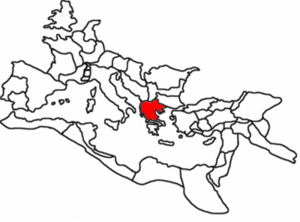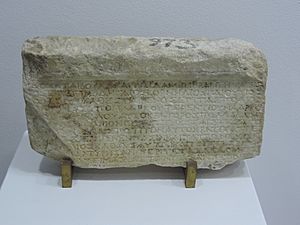Marcus Terentius Varro Lucullus facts for kids
Quick facts for kids
Marcus Terentius Varro Lucullus
|
|
|---|---|
| Born |
Marcus Licinius Lucullus
116 BC |
| Died | soon after 56 BC |
| Nationality | Roman |
| Office | Consul (73 BC) Governor of Macedonia (72 BC) |
Marcus Terentius Varro Lucullus (born 116 BC, died soon after 56 BC) was an important Roman leader. He was the younger brother of the famous general Lucius Licinius Lucullus. Marcus was a strong supporter of Lucius Cornelius Sulla, a powerful Roman general. He became a consul of ancient Rome in 73 BC.
As governor of Macedonia in 72 BC, he led Roman armies to victory. He defeated the Bessi tribe in Thrace. His forces reached the Danube River and the western coast of the Black Sea. Marcus Lucullus also played a small part in the Third Servile War, also known as Spartacus' War.
Contents
Life Story of Marcus Lucullus
His Name and Family
Marcus was born in Rome with the name Marcus Licinius Lucullus. Later, he was adopted by a man named Marcus Terentius Varro. This adoption changed his full official name. It became Marcus Terentius Varro Lucullus.
Sometimes, old writings just call him M. Lucullus or Lucullus. This could sometimes cause confusion with his more famous older brother, Lucius.
Early Public Life
In the early 90s BC, young Marcus and his brother Lucius tried to bring charges against Servilius. This man had earlier accused their father, Lucius Licinius Lucullus. Their father was sent away from Rome for misusing public money.
Serving Under Sulla
In 83 BC, Sulla returned from the East to fight his enemies, the Marians. Marcus Lucullus and his brother Lucius joined Sulla's army. Marcus served under his cousin, Quintus Caecilius Metellus Pius, in Northern Italy.
At first, Marcus Lucullus had to retreat into the town of Placentia. But after Metellus defeated a larger enemy army, Marcus broke the siege. He then defeated a part of the enemy forces. At Fidentia, Marcus led 15 groups of soldiers, about 3,600 men. He managed to defeat a much larger enemy force of 50 groups, about 12,000 men. His troops killed 1,800 enemy soldiers.
Becoming a Priest
Marcus Lucullus was likely chosen to join the Pontifical College. This was a group of important Roman priests. This probably happened in 81 BC when Sulla added more members to the college.
Being a member of one of these four main priestly groups was a great honor. It was almost as respected as becoming a consul. This showed that Marcus Lucullus had a promising future ahead of him.
Serving as Aedile
Even though he wasn't in Rome for the elections of 80 BC, Marcus Lucullus was elected. He became a curule aedile for 79 BC, along with his older brother Lucius. Aediles were Roman officials who managed public buildings and organized games.
Their time as aediles was remembered for its amazing games. They introduced new things, like turning backdrops for theater stages. They were also the first to have an elephant fight a steer in the arena.
Working as a Judge
In 76 BC, Marcus Lucullus was elected praetor peregrinus. This meant he was a judge in charge of court cases involving people who were not Roman citizens. He oversaw an important trial against Gaius Antonius Hybrida.
Antonius was accused of taking money unfairly while serving in Greece. A young Julius Caesar was the accuser and won the case. However, Antonius managed to get his conviction overturned. He argued he couldn't get a fair trial in Rome against a Greek man.
Marcus Lucullus also made a rule about groups of slaves causing trouble. This rule allowed victims to claim four times the amount of their damages from the slave owners.
Consul and Governor of Macedonia
In 73 BC, Marcus Lucullus became a consul with Gaius Cassius Longinus. As consul, he helped pass a law that gave cheap grain to poor Roman citizens.
His name also appears on an old stone inscription. This inscription is a letter telling the people of Oropos in Greece about a decision by the Roman Senate. It was about their disagreement with Roman tax collectors.
After being consul, Marcus Lucullus became the governor of Macedonia. He used this position to lead a successful military campaign. He fought against the Thracian Bessi tribe. During this war, he reached the Danube River and the Black Sea coast. He conquered several Greek cities there, including Apollonia, Kallatis, Tomi, and Istros. These cities had been used as bases by Mithridates VI.
For these victories, Marcus Lucullus was given a triumph in 71 BC. A triumph was a grand parade to celebrate a military victory. As part of his spoils, he brought a huge statue of Apollo from a temple near Apollonia. He likely placed this statue in the Temple of Jupiter Optimus Maximus in Rome.
Earlier in 71 BC, Marcus Lucullus also played a small part in defeating Spartacus's slave army. He was called back from Macedonia to help stop the slave rebellion. Spartacus had just broken through Crassus' army and was heading towards Brundisium. He probably planned to sail to Greece. But when Spartacus heard that Marcus Lucullus and his troops had landed in Brundisium, he turned back. He then faced Crassus's army in the final battle of the war.
Later Years and Death
In 70 BC, Marcus Lucullus helped Cicero in his famous case against Verres. Marcus appeared as a witness for the prosecution.
In 66 or 65 BC, Marcus Lucullus was put on trial for his actions under Sulla. However, he was found not guilty. In 65 BC, he was a witness for the prosecution in a trial against Gaius Cornelius. Cornelius was defended by Cicero.
In 63 BC, Marcus Lucullus opposed Catilina's plan to kill the consuls, including Cicero, and take over the government. The next year, he was the main witness for his friend, the poet Aulus Licinius Archias. Cicero gave a famous speech defending Archias's claim to Roman citizenship.
Later, in 58 and 57 BC, Marcus Lucullus worked to help Cicero return from exile. When his brother, Lucius Lucullus, became very ill and couldn't manage his affairs, Marcus became his legal guardian. He buried his brother in 56 BC. Marcus Lucullus himself died not long after.
See also
 In Spanish: Marco Terencio Varrón Lúculo para niños
In Spanish: Marco Terencio Varrón Lúculo para niños
- Lucullus
- Licinia gens
 | Georgia Louise Harris Brown |
 | Julian Abele |
 | Norma Merrick Sklarek |
 | William Sidney Pittman |



